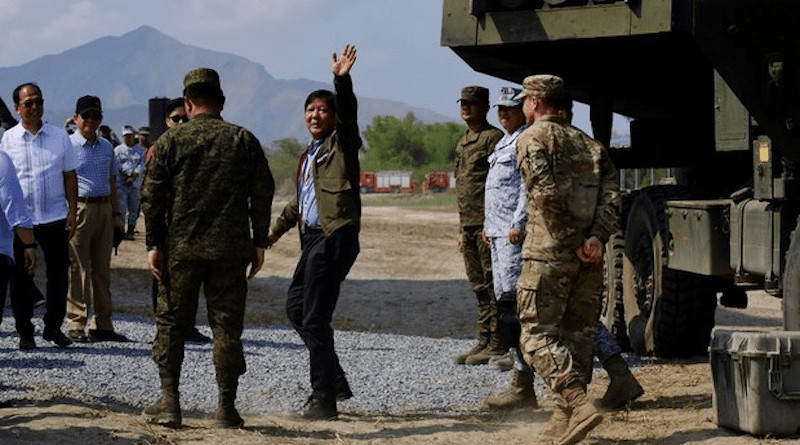US, Philippine Troops Sink Ship In War Games Exercise As Marcos Watches
By BenarNews
By Camille Elemia and Jason Gutierrez
Philippine President Ferdinand Marcos Jr. on Wednesday watched U.S. and Philippine troops stage a mock attack to sink an enemy ship in the South China Sea.
The strike, the culmination of this year’s largest-ever military exercise between the two allies, took place in Zambales, a province facing the West Philippine Sea, the part of the disputed South China Sea in Manila’s exclusive economic zone.
Clad in an army green jacket bearing the presidential logo and patches of the two countries’ security and defense boards, Marcos was the first president in a decade to watch a major event at the annual bilateral exercise called Balikatan, meaning “shoulder-to-shoulder” in Tagalog.
Analysts said Marcos’s attendance was an indication of the strengthening alliance with the United States amid China’s increasing assertion in the disputed South China Sea and aggravated tensions between Beijing and Taipei.
About 1,400 troops from both nations participated in Wednesday’s events which saw U.S. and Philippine weapons being fired on a decommissioned Philippine Navy ship BRP Pangasinan.
Along with High Mobility Artillery Rocket System (HIMARS), weapons used on the ship included the U.S. Avenger air defense systems, AH-64 Apache attack helicopters and Philippine Air Force FA-50 Golden Eagle fighter-attack aircraft.
On occasion, the live-fire exercises had to be stopped as unidentified “interlopers,” including a civilian aircraft, entered the operational zone, said Col. Michael Logico, spokesman for the Philippine contingent.
He said Marcos learned about the capability of weapons systems, as well as the workings of combined operations.
“The president came away with a deeper appreciation for joint and combined operations, he asked a lot of questions and we answered them to the best of our ability. … That means that he is deeply interested in how we operate together,” Logico told reporters after the exercise.
“The message that we are trying to send is that the [U.S.-Philippine] alliance is alive and that we are always challenging ourselves so one Balikatan is always going to be harder and more complex than the previous Balikatan.” Logico said.
“What we can say is that the reason we are doing an exercise at this magnitude is because we are exercising or demonstrating our ability to be interoperable with our U.S. counterpart which is also our treaty ally.”
The two nations’ troops “were able to demonstrate this at the operational level of war,” he said.
From “planning up to execution, we have to prove that we can do this together, side by side as treaty partners are expected to be,” Logico said.
U.S. Army officers welcomed Marcos and briefed him about HIMARS, a precision strike weapons system. The president watched the combined live-fire exercise from the top of a four-story building facing the sea.
Mixed reactions
Don McLain Gill, a Manila-based geopolitical analyst, said Marcos was trying to blunt China’s territorial objectives in the region “which continue to come at the expense of the Philippines’ sovereignty.”
Marcos has been seeking a cordial relationship with China since becoming president last year. He went to Beijing on a state visit in January, but despite such efforts, China has continued its provocative actions, Gill said.
The Philippines and China have overlapping territorial claims in the South China Sea, and Beijing has repeatedly sent its ships into Manila’s Exclusive Economic Zone in the waterway.
“Being rational of course, we sought to leverage on our alliance with our traditional security partner to enhance our ability to defend our territorial integrity and sovereign rights more effectively,” Gill told BenarNews, referring to Manila’s ally Washington.
“However, our policy with China will remain proactively autonomous, we will prioritize diplomatic negotiations, but the manner in which it will be maximized will depend on how well China will comply by becoming a better neighbor.”
Gill said Manila wants to have “good and productive relations” with Beijing, “but it will not allow itself to be subjugated to China’s narrowly defined objectives in the region.”
China has never accepted a 2016 ruling by the Permanent Court of Arbitration in The Hague, in a case brought by the Philippines, which said that Beijing’s expansive “historical claims” in the South China Sea have no legal basis.
Still, after hosting Chinese Foreign Minister Qin Gang in Manila last week, Marcos said the meeting was helpful in “ironing things out” between the two countries.
Qin’s visit came days after the Chinese envoy to the Philippines said Manila must “unequivocally oppose Taiwan independence rather than stoking the fire by offering the U.S. access to the military bases near the Taiwan Strait.”
Defense analyst and historian Jose Antonio Custodio of the Manila-based Institute of Policy, Strategy and Development Studies, noted that the alliance with the U.S. “is still viable despite the damage done to it” by former leader Rodrigo Duterte.
“It [Balikatan] also shows China the capabilities the U.S. has in the region should Beijing decide to use military force against Taiwan,” he told BenarNews, about the island that China considers a renegade province.
“They can’t do much. American and allied power against them is overwhelming.”
The exercises occurred amid growing regional anxiety over China’s threats directed at Taiwan.
Beijing has opposed Manila’s move to grant Washington expanded access to military bases under the Enhanced Defense Cooperation Agreement between the two nations.
The Philippines has allowed the U.S. to access four additional sites including two military bases in northern Luzon near Taiwan, along with one in the western province of Palawan facing the South China Sea.
Mark Navales, Jojo Riñoza and Jeoffrey Maitem in San Antonio, Philippines, contributed to this report.

